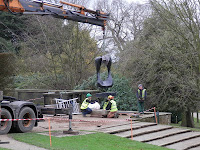For many, quite reasonably, “Hymns” is the album that provides the bridge, for those interested in the career of Justin Broadrick, between Godflesh and Jesu. The songs on “Hymns”, it could be argued, are beginning to lose some of the ferocity of previous releases and are taking on a more ethereal quality more reminiscent of the characteristic Jesu sound.
Originally released in 2001 as a follow up to “In All Languages”, this reissue, remastered by Broadrick, gives those familiar with the album the opportunity to hear it with more clarity. And with the benefit of a number of demos, and the track “If I Could Only Be What You Want”, an unreleased track from the original sessions, the chance to consider the cultural history of Godflesh.
Possibly some of the clearer indicators of where Broadrick is going with Jesu are on “Anthem” and “Voidhead”. The voice here displays a purity and minimalism that was later to become a feature of that project. The vocals are still however riding on those gorgeous guitar riffs that are simultaneously luscious and melancholic, yet menacing and foreboding. The aggression has not totally been forgotten nevertheless, as tracks such as “Tyrant” display a hostility and danger that is adored by many, whilst “White Flag” lumbers along with the percussion very much in the foreground, again, arguably, a key indicator as to what was to come with Jesu.
“Antihuman” evolves as a repeated opening phrase mutates into the basis of the arrangement. There is a mesmerising quality to this music as a whole which is achieved through repetition and wraithlike vocal. The final track “Jesu” is pregnant with a dark momentum and is characteristic of this repetitious trait. A tension is built which gradually dissipates into the electronic ether. Again, some may say the ideal swansong for Godflesh....
Read the full review at This Is Not A Scene


















